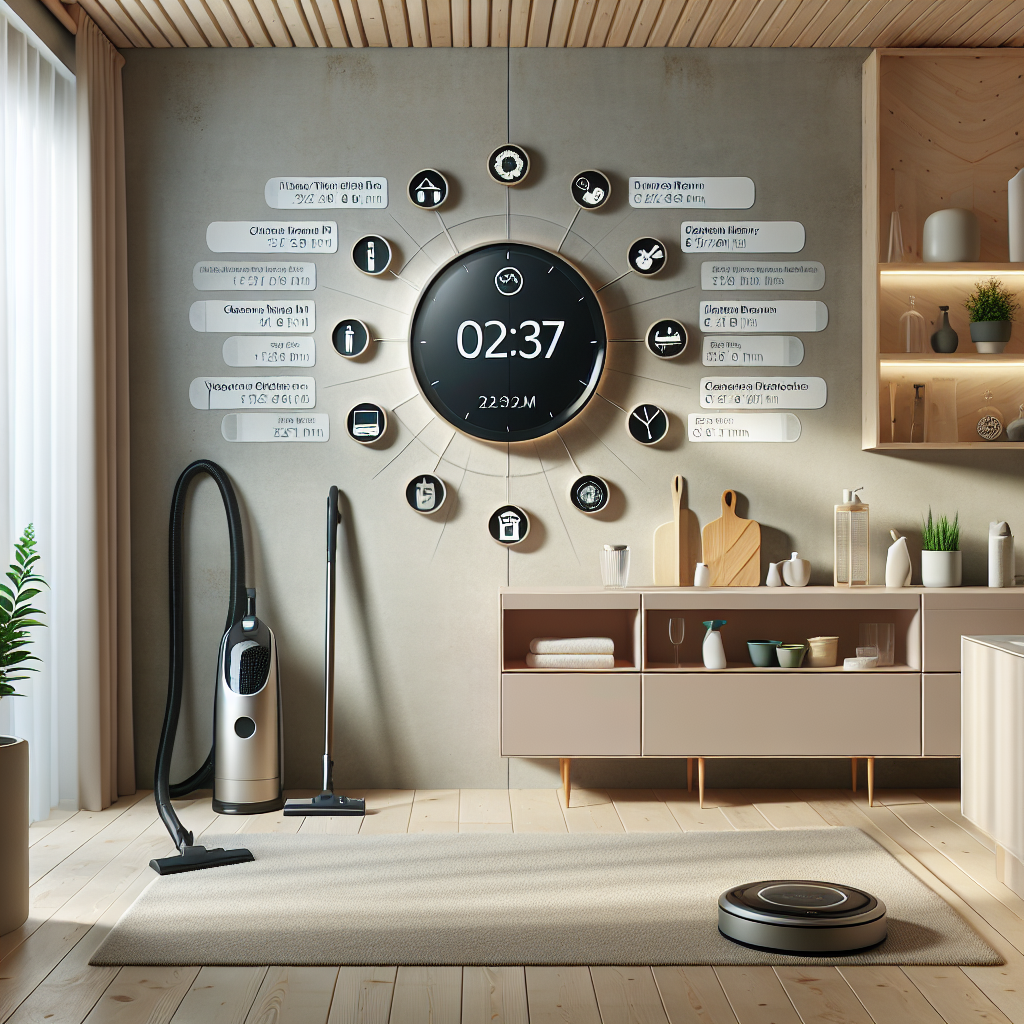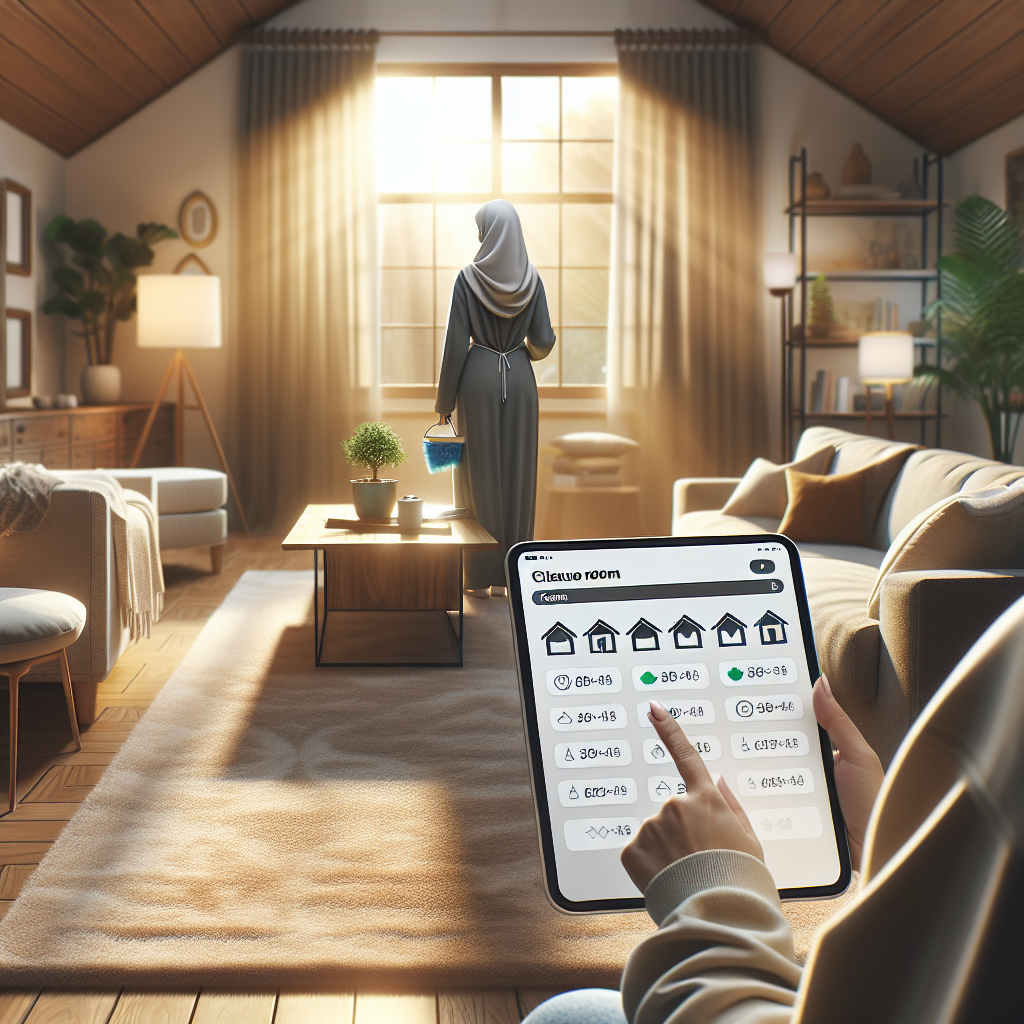- September 18, 2024
- Derek
House Cleaning Time Estimator
In today’s fast-paced world, managing household chores efficiently is more important than ever. A house cleaning time estimator can be a game-changer, helping you plan your day and optimize your cleaning routines. By accurately estimating the time required for different cleaning tasks, you can allocate your time wisely and ensure that every corner of your home is spotless.
House cleaning time estimators work by breaking down cleaning tasks into smaller, manageable segments. For instance, you can estimate the time needed to clean a bathroom, vacuum the living room, or dust the bedrooms. This approach not only makes the cleaning process less overwhelming but also allows you to prioritize tasks based on their importance and the time you have available.
Moreover, using a house cleaning time estimator can help you maintain a consistent cleaning schedule, ensuring that no task is overlooked. Whether you are preparing for guests, maintaining a weekly cleaning routine, or tackling a deep clean, an effective time estimator can be your trusty companion.
Ready to streamline your cleaning routine and make the most of your time? Visit our website to learn more and get your FREE Quote today! Click here.
Benefits of Using a Cleaning Time Estimator

Utilizing a cleaning time estimator offers a multitude of benefits that can transform your approach to household chores. One of the primary advantages is improved time management. By having a clear estimate of how long each task will take, you can create a realistic cleaning schedule that fits seamlessly into your day. This prevents the common pitfall of underestimating or overestimating the time required, leading to a more balanced and stress-free lifestyle.
Another significant benefit is increased efficiency. A cleaning time estimator allows you to identify which tasks can be completed quickly and which require more time, helping you to prioritize your efforts effectively. This can be particularly useful when you have limited time and need to focus on the most critical areas of your home.
Additionally, a cleaning time estimator can help you maintain consistency in your cleaning routines. Regularly scheduled cleaning sessions become more manageable when you know exactly how much time to allocate for each task. This consistency ensures that your home remains clean and inviting, reducing the need for extensive deep cleaning sessions.
For those who share cleaning responsibilities with family members or roommates, a cleaning time estimator can also promote fairness and accountability. By clearly outlining the time required for each task, everyone can contribute equally, making the workload more manageable and fostering a sense of shared responsibility.
Overall, incorporating a cleaning time estimator into your routine can lead to a more organized, efficient, and harmonious household, allowing you to enjoy a cleaner home with less effort.
Factors That Influence Cleaning Time

Several factors can significantly influence the amount of time needed to clean your home, and understanding these can help you make more accurate estimates. One of the primary factors is the size of your home. Naturally, larger homes with more rooms and square footage will require more time to clean compared to smaller spaces.
The level of cleanliness is another crucial factor. If your home has not been cleaned for an extended period, it will take more time to tackle built-up dirt and grime. Regular maintenance, on the other hand, can reduce the time needed for each cleaning session.
Additionally, the type of cleaning being performed plays a significant role. Routine tasks like dusting and vacuuming take less time than more intensive chores such as deep cleaning carpets, scrubbing bathrooms, or cleaning out the refrigerator.
The number of occupants and pets in the household also affects cleaning time. More people and pets typically lead to more messes and higher traffic areas that require frequent attention. For instance, pet hair can necessitate daily vacuuming, while high-traffic areas may need more frequent mopping.
The availability and quality of cleaning tools and products can also make a difference. Using efficient, high-quality cleaning supplies can speed up the process, while outdated or ineffective tools can slow you down.
Lastly, your personal cleaning habits and techniques can influence the duration of your cleaning tasks. Some people are naturally faster and more efficient cleaners, while others may take a more meticulous approach, which can extend the time needed.
Understanding these factors allows you to better estimate the time required for cleaning and helps in planning your day more effectively.
Steps to Create Your Cleaning Time Estimator

Creating a house cleaning time estimator can streamline your cleaning routine and help you manage your time more efficiently. Follow these steps to develop your personalized cleaning time estimator:
1. List All Cleaning Tasks: Start by listing all the cleaning tasks you need to complete. This could include dusting, vacuuming, mopping, cleaning bathrooms, and so forth. Break down larger tasks into smaller, manageable steps to get a clear picture of what needs to be done.
2. Estimate Time for Each Task: Assign an estimated time for each task on your list. If you are unsure, time yourself while performing each task during your next cleaning session. This will provide a realistic estimate based on your actual cleaning speed.
3. Consider Frequency: Determine how often each task needs to be done. Some tasks may require daily attention, while others might be weekly or monthly. This will help you distribute your cleaning workload evenly throughout the week or month.
4. Identify Peak Cleaning Times: Take note of when your home tends to get the dirtiest or when you have the most time available for cleaning. Use this information to schedule more intensive cleaning sessions during these periods.
5. Create a Cleaning Schedule: Combine your list of tasks, estimated times, and frequency into a practical schedule. This can be a daily, weekly, or monthly plan, tailored to fit your lifestyle. Ensure to allocate buffer time for unexpected chores or interruptions.
6. Use Tools and Apps: Utilize tools and apps designed for task management and time tracking. These can help you stay organized and adjust your schedule as needed. Many apps offer features like reminders and progress tracking to keep you on top of your cleaning routine.
7. Revise and Optimize: Regularly review your cleaning time estimator and make adjustments based on your experiences. As you become more efficient, you may find that certain tasks take less time, allowing you to optimize your schedule further.
By following these steps, you can create an effective cleaning time estimator that suits your needs and ensures your home remains clean and organized without overwhelming your day.
Tips for Efficient Cleaning Schedule

Creating an efficient cleaning schedule can make a huge difference in maintaining a clean and organized home. Here are some tips to help you optimize your cleaning routine:
1. Prioritize Tasks: Identify the most critical cleaning tasks that need immediate attention and tackle them first. Focus on high-traffic areas and spaces that are more prone to getting dirty, such as the kitchen and bathrooms.
2. Set Realistic Goals: Avoid overwhelming yourself by setting achievable cleaning goals. Break down large tasks into smaller steps and spread them out over the week. This will help you stay motivated and prevent burnout.
3. Use a Timer: Set a timer for each task to keep yourself on track and prevent spending too much time on any one chore. This can help you maintain a steady pace and complete your cleaning efficiently.
4. Declutter Regularly: A clutter-free space is easier and quicker to clean. Make it a habit to declutter regularly by putting away items and getting rid of things you no longer need. This will reduce the amount of time spent organizing and cleaning.
5. Multitask Smartly: Combine tasks that can be done simultaneously. For example, you can let the cleaning solution sit in the bathroom while you dust the living room. This way, you make the most of your time and get more done.
6. Invest in Quality Cleaning Tools: High-quality cleaning tools and products can make your cleaning tasks more efficient and effective. Look for tools that are easy to use and can handle multiple tasks, such as a vacuum with various attachments.
7. Create a Routine: Establish a consistent cleaning routine by assigning specific tasks to certain days of the week. This helps build a habit and ensures that your home stays clean without requiring a massive effort all at once.
8. Get Everyone Involved: If you live with family or roommates, make cleaning a team effort. Assign tasks to each person based on their abilities and preferences. This not only lightens the workload but also promotes a sense of shared responsibility.
By implementing these tips, you can create a more efficient cleaning schedule that saves time and keeps your home looking its best. Remember, consistency is key to maintaining a clean and organized living space.
Maintaining Consistency in Cleaning Routine

Maintaining a consistent cleaning routine is crucial for ensuring that your home remains tidy and welcoming. Here are some strategies to help you stay consistent and keep your living space in top condition:
1. Set a Schedule: Create a weekly or monthly cleaning schedule and stick to it. Allocate specific days for different tasks, such as vacuuming on Mondays and cleaning the bathrooms on Wednesdays. A structured schedule helps build a routine and keeps you on track.
2. Use a Planner or App: Utilize a planner or a cleaning app to keep track of your tasks. These tools can send you reminders and help you stay organized, ensuring that no chore is overlooked.
3. Start Small: If you’re struggling to maintain consistency, start with small, manageable tasks. Gradually increase the scope of your cleaning as you become more comfortable with your routine.
4. Reward Yourself: Treat yourself after completing your cleaning tasks. Rewards could be something simple, like enjoying a favorite snack or taking a relaxing bath. Positive reinforcement can motivate you to stay consistent.
5. Make It a Habit: Incorporate cleaning into your daily habits. For example, make it a rule to tidy up the kitchen after every meal or to make your bed every morning. Consistent small actions can lead to a cleaner home overall.
6. Involve the Whole Household: Ensure that everyone in the household participates in maintaining cleanliness. Assign age-appropriate tasks to children and encourage everyone to take responsibility for their own spaces.
7. Stay Flexible: Life can be unpredictable, so it’s important to stay flexible with your cleaning routine. If you miss a scheduled task, don’t stress—just reschedule it and move forward.
8. Regularly Review and Adjust: Periodically review your cleaning schedule and adjust it as needed. This ensures that your routine remains effective and relevant to your current lifestyle.
Consistency is the key to a clean and orderly home. By implementing these strategies, you can maintain a cleaning routine that fits seamlessly into your life, providing you with a consistently clean and inviting living space.
*Ready to take your cleaning routine to the next level?* Visit our website to learn more and get your FREE Quote today!
